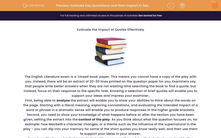
The English Literature exam is a 'closed book' paper. This means you cannot have a copy of the play with you. Instead, there will be an extract of 20-30 lines printed on the question paper for you. Examiners say that people write better answers when they are not wasting time searching the book to find a quote, but instead, focus on their response to the specific task. Knowing a selection of brief quotes will enable you to support your ideas and impress your examiner.
First, being able to analyse the extract will enable you to show your abilities to think about the words on the page. Starting with a literal meaning, exploring connotations, and evaluating the intended impact of a word or phrase in a dramatic sense will enable you to produce responses in the higher grade brackets.
Second, you need to show your knowledge of what happens before or after the section you have been given, setting the extract into the context of the play. As you think about what the question focuses on, for example: how Macbeth's character changes, or a theme such as the influence of the supernatural in the play - you can dip into your memory for some of the short quotes you know really well, and then use them to support your ideas in your answer.
Examiners like to see brief plans included with an answer; they advise that students construct better arguments when they show evidence of planning before they begin to write. At GCSE, the best marks are awarded to answers which establish links from the exam extract to the rest of the text. This means that a few moments spent unpicking the question, constructing an argument based on relevant points and ideas, noting some supporting quotes to refer to is an investment that pays you a return in the form of top marks!







